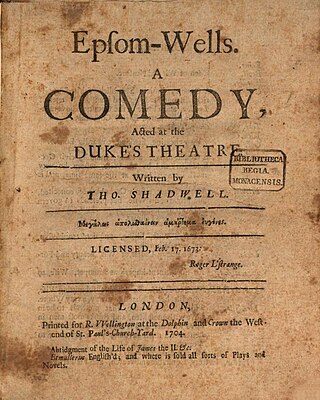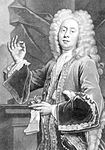Related Research Articles

The Duke's Company was a theatre company chartered by King Charles II at the start of the Restoration era, 1660. Sir William Davenant was manager of the company under the patronage of Prince James, Duke of York. During that period, theatres began to flourish again after they had been closed from the restrictions throughout the English Civil War and the Interregnum. The Duke's Company existed from 1660 to 1682, when it merged with the King's Company to form the United Company.
The Royalist is a 1682 comedy play by the English writer Thomas D'Urfey. It was staged at the Dorset Garden Theatre by the Duke's Company, shortly before the merger that created the United Company. It is set during the Commonwealth Era following the English Civil War.

Epsom Wells is a 1672 restoration comedy by the English writer Thomas Shadwell. It was the first in a line of plays set in spa towns. The incidental music was composed by Nicholas Staggins. In the 1690s Henry Purcell scored a new staging of the play. It was performed at the Dorset Garden Theatre by the Duke's Company. The cast included Henry Harris as Rains, Thomas Betterton as Bevil, William Smith as Woodly, Cave Underhill as Justice Clodpate, Anne Gibbs as Lucia, Mary Betterton as Mrs Jilt, James Nokes as Bisket and Edward Angel as Fribble.
Herod and Mariamne is a 1671 tragedy by the English writer Samuel Pordage. It was first performed by the Duke's Company at the Lincoln's Inn Fields Theatre in London shortly before they moved to the Dorset Gardens Theatre. It was the company's attempt to respond to the great success of John Dryden's heroic drama The Conquest of Granada by the rival King's Company. It is inspired by the accounts of Josephus portraying the reign of Herod II.
The Slighted Maid is a 1663 comedy play by the English writer Robert Stapylton.
The English Princess; Or, The Death Of Richard The Third is a 1667 tragedy by the English writer John Caryll. It is set around the downfall of Richard III. It was performed at Lincoln's Inn Fields by the Duke's Company. Although the full cast is unknown it included Thomas Betterton as Richard III, Henry Harris as Duke of Richmond and William Smith as Sir William Stanley. In his diary Samuel Pepys described it as a "a most sad, melancholy play, and pretty good; but nothing eminent in it, as some tragedys are" At the end of the show actress Moll Davis came on stage to dance a jig and announcer the next day's performance.
Squire Oldsapp is a 1678 comedy play by the English writer Thomas D'Urfey. Staged by the Duke's Company at the Dorset Garden Theatre in London, the original cast included Thomas Betterton as Welfore, William Smith as Henry, John Crosby as Lovell, James Nokes as Squire Oldsapp, Anthony Leigh as Sir Frederick Banter, Samuel Sandford as Colonel Buff, Cave Underhill as Pimpo, Emily Price as Christina and Elizabeth Currer as Madame Tricklove.
The Country Wit is a 1676 comedy play by the English writer John Crowne, part of the tradition of Restoration Comedy. It was first staged at the Dorset Garden Theatre in London by the Duke's Company. The cast included Samuel Sandford as Sir Thomas Rash, Thomas Betterton as Ramble, James Nokes as Sir Mannerly Shallow, Henry Harris as Merry, Cave Underhill as Booby, Matthew Medbourne as Lord Drybone, Anthony Leigh as Rash, Mary Betterton as Lady Faddle, Mary Lee as Christina, Elizabeth Currer as Betty Frisque and Elinor Leigh as Isabella.
The Counterfeits is a 1678 comedy play by the English writer John Leanerd. It was staged by the Duke's Company at the Dorset Garden Theatre with a cast that included Anthony Leigh as Don Gomez, Thomas Gillow as Don Luis, Thomas Betterton as Vitelli, Henry Harris as Antonio, Matthew Medbourne as Carles, William Smith as Peralta, Thomas Percival as Dormilon, Cave Underhill as Fabio, Joseph Williams as Crispin, John Richards as Tonto, Mary Lee as Elvira, Emily Price as Violante and Anne Shadwell as Flora.

The Counterfeit Bridegroom; Or, The Defeated Widow is a 1677 comedy play. The work's authorship is usually credited to Aphra Behn has been alternatively been attributed to Thomas Betterton. It was inspired by Thomas Middleton's Jacobean play No Wit, No Help Like a Woman's.

The She-Gallants is a 1695 comedy play by the English writer George Granville. It was first staged by Thomas Betterton's Company at the Lincoln's Inn Fields Theatre in London.

The Cutter of Coleman Street is a comedy play by the English writer Abraham Cowley. It premiered at the Lincoln's Inn Fields Theatre on 16 December 1661, performed by the Duke's Company. Cowley had originally written it in 1658 during the English Commonwealth era. The title refers to Coleman Street in the City of London. The Royalist Cowley inserted lines mocking the recent republican government of England, including Thomas Harrison who had been executed for regicide the previous year. Although it was released during the Restoration period, along with The Committee its debt to earlier traditions mean that it not a full Restoration comedy in the style that would flourish after George Etherege's The Comical Revenge in 1664.

The Comical Revenge; Or, Love In A Tub is a 1664 comedy play by the English writer George Etherege. First staged by the Duke's Company, it premiered at the Lincoln's Inn Fields Theatre. It is one of the earliest Restoration Comedies. The play holds importance for the literary historian for Etherege's employment of two separate language styles. The style employed in the verbal sparring between Sir Frederick and the Widow would set the standard for the language of the Restoration comedy. The subtitle refers to the comical subplot which deals with the locking up of Dufoy, servant of Sir Frederick, in a tub by the chambermaids Betty and Lettice.
The Reformation is a 1673 comedy play by Joseph Arrowsmith. Originally staged by the Duke's Company, it premiered at the Lincoln's Inn Fields Theatre in London. The cast included Samuel Sandford as Camillo, Anthony Leigh as Pacheco, Cave Underhill as Tutor, Henry Harris as Antonio, Philip Cademan as Pedro, John Crosby as Leandro, Matthew Medbourne as Lysander, Mary Betterton as Juliana, Margaret Osborne as Lelia and Mary Lee as AEmilia.
The Massacre of Paris is a 1689 tragedy by the English writer Nathaniel Lee. It was first staged by the United Company at the Theatre Royal, Drury Lane. It is based around the 1572 St. Bartholomew's Day massacre which led the killing of many Huguenots during the French Wars of Religion. The events had previously been portrayed in Christopher Marlowe's Elizabethan play The Massacre at Paris.

Bury Fair is a 1689 comedy play by the English writer Thomas Shadwell. It is part of the tradition of Restoration Comedy that flourished during the era. It was first staged by the United Company at the Theatre Royal, Drury Lane in London.

The Villain is a 1662 tragedy by the English writer Thomas Porter. It was originally staged by the Duke's Company at the Lincoln's Inn Fields Theatre in London. The first cast included Thomas Betterton as Monsieur Brisac, Henry Harris as Monsieur Beaupre, John Young as Bontefeu, Samuel Sandford as Maligni and Mary Betterton as Bellmont. William Davenant wrote the epilogue.

Love Triumphant; Or, Nature Will Prevail is a 1694 tragicomedy by the English writer John Dryden. It was Dryden's final stage play.

Madam Fickle; Or, The Witty False One is a 1676 comedy play by the English writer Thomas D'Urfey. It was first staged at the Dorset Garden Theatre by the Duke's Company.

Sir Salomon; Or, The Cautious Coxcomb is a 1670 comedy play by the English writer John Caryll. It has often been staged under the title Sir Solomon Single. It was first performed by the Duke's Company at the Lincoln's Inn Fields Theatre in London. It is part of the tradition of Restoration comedy.
